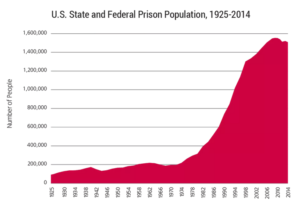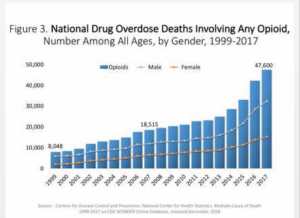It IS broke. Let’s fix it.


I’ve spent more time inside a prison than most civilians. And I’ve probably spent more time reading about and thinking about incarceration than most people who don’t study or work for the corrections industry.
I know, as much as a civilian can know, what that environment feels like. It is soul-crushing. Much has been written about the damage incarceration inflicts—from teaching helplessness to sparking hostility, from exacerbating mental health issues to eroding the physical and emotional health of the children of the incarcerated. And much has been written about the system’s failure to do what we want it to do: reduce crime.
But until I read this study in Lancet (0ne of the oldest, most prestigious science journals),
I had not considered that our epidemic of mass incarceration might be linked to the astonishing rise in drug overdose fatalities we’ve all been reading about.
Yes, it’s not news that prison and drugs are linked. The war on drugs accompanied by tough-on-crime mandatory sentencing policies sent and continues to send hundreds of thousands to prison. And yes, a significant percentage of people who commit crimes have some involvement with drugs. (Women’s crimes, in particular, are often to support drug habits.) And yes, drugs are a problem inside prison.
But this study in Lancet suggests an entirely different connection between incarceration and drugs. Based on meticulous crunching of several huge data sets, the study concludes that there is a strong association—a “robust connection”– between the rise in incarceration rates and deaths from drug use.
Data came from 2,600 counties across the country and spanned 1983-2014. The study found that, on average, counties with the highest incarceration rates saw a drug mortality rate 54 percent higher than the rate among counties with the lowest incarceration rates. (The relative poverty of the community accounted for half of this difference; the other half was the rate of incarceration.)
Incarceration, they write, “is directly associated with stigma, discrimination, poor mental health, and chronic economic hardship, all of which are linked to drug use disorders.”
Here’s how one of the co-authors of the study, an economics professor at University of Massachusetts, put it: “In communities with high incarceration rates, it’s making their lives much worse, and making them much more likely to use drugs dangerously.”
In other words, if you came to prison with a drug problem (as a reported 50 percent do), then when you are released (as 95 percent of prisoners are), the conditions are ripe for continued or increased abuse. If you didn’t already have a drug problem, the experience of and stigma attached to incarceration might pave the way to abuse.






1 comment
Having a record diminishes job opportunities. The lost time of work experience also limits opportunities. What’s a guy to be with so much idle time?
Leave a Comment